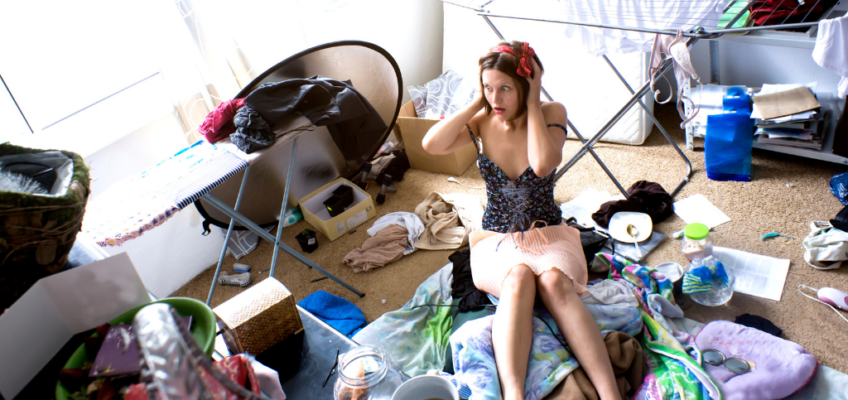Many times people cannot dispose of clutter. Items have been sitting in closets, attics, or basements for 20 years, forgotten, until uncovered during a purging process. All of a sudden, the owner cannot let go of the item. Why?
Some people let mail pile up for weeks and months, incurring late fees, lawsuits, penalties, and worse. Yet, they cannot face the piles of paper and bills on their desk. Why?
Fear is one of the biggest stop signs interfering with the decluttering process. It is not fear of the decluttering process per se, but the fear of what will be uncovered in the piles that the person wants to avoid. How does fear show up in your life, affecting the decluttering process? Here are 20 examples:
1. Are there insurance forms that you do not know how to complete so you fear seeing them and leave them buried, hoping the issue will go away?
2. Are there bills that you fear because you do not have the money to pay them so you leave them buried in a pile, hoping they will disappear?
3. Are there legal papers from a lawsuit that requires your attention but you fear taking action so you leave them hidden?
4. Is there a project that you never completed and fear failure so you leave it buried in a pile?
5. Do you fear forgetting a loved one if you dispose of their possessions?
6. Do you fear losing a significant memory if you donate favorite objects of a deceased family member?
7. Did a family member give you a present that you don’t like but you fear their backlash if they discover you donated the item, so you leave it buried in a pile?
8. Do you buy 30 or 40 items of the same thing at a grocery store or big box store because you fear the store might run out or discontinue the item?
9. Is there a thank you card that you never sent and you fear embarrassment about its tardiness?
10. Are there donation solicitation letters that tug at your heart and you fear feeling guilty because you do not have extra funds to mail a check so you leave those letters piled up on your desk, way past their campaign cycle date?
11. Do you fear the waste of money throwing away clothes that you purchased but did not wear?
12. Do you fear losing your knowledge if you give away a lot of books or if you trash your college and grad school textbooks?
13. Do you fear financial insecurity and hence retain things “just in case” you might need them someday in the future?
14. Do you fear throwing out important documents because you do not know the retention guidelines?
15. Do you fear missing out on an opportunity, such as a community event, work conference, or neighborhood social, so therefore keep out-of-date flyers all over your refrigerator or table?
16. Do you fear self-loathing because you have not completed the hobby project that has been in process for years and for which you purchased tons of supplies that are now deemed aspirational clutter?
17. Do you fear doing things imperfectly so you do not do anything at all, resulting in the project never getting done?
18. Do you fear the shame, embarrassment, sarcasm, and judgments that you will experience if friends or family members saw your place so you do not invite anyone over to your house?
19. Do you fear the pain of disposing of half-used paint cans or other items, even if they are 20 years old, because you might be harming the environment or seen as wasteful?
20. Do you fear disposing of magazines despite them being 5 years old because you have not read them and you might be missing out on something important?
And the fears go on and on and on….
And the house fills up with all these items resultant
from unhealthy, fear-based beliefs.
Here are some inspiring quotes to help you face your fears. And below, are some suggestions on how you can walk through your fears from a decluttering point of view.
“You gain strength, courage and confidence by every experience in which you really stop to look fear in the face. You are able to say to yourself, ‘I have lived through this horror. I can take the next thing that comes along.’ You must do the thing you think you cannot do.”
– Eleanor Roosevelt
– Judy Blume
“Each of us must confront our own fears, must come face to face with them. How we handle our fears will determine where we go with the rest of our lives. To experience adventure or to be limited by the fear of it.”
– Nelson Mandela
“I learned that courage was not the absence of fear, but the triumph over it. The brave man is not he who does not feel afraid, but he who conquers that fear.”
– Ralph Waldo Emerson
“He who is not everyday conquering some fear has not learned the secret of life.”
So how do you face your fears in order to walk through the clutter and free your mind and space? Here are 10 suggestions:
a. Photograph or videotape the object(s). Have a friend videotape or photograph you holding or using the object(s). This way you can retain the memory and not the item.
b. Journal about your fears in regard to getting rid of particular items. What does the item(s) mean to you? How did it serve you in the past? How long has its purpose with you been completed? Can it serve someone else now? Why is that object(s) meaningful to you? What emotion (good or bad) does it evoke? Let the writing in your journal flow as it will reveal more and more layers of emotion, and you will go deeper in uncovering the origin of the fear.
c. Intentionally throw away or donate one thing. Write what the item is on a piece of paper. Fold the paper and place it in an envelope with a stamp and address the envelope to yourself. Mail it and when it arrives a few days later, before you open it, ask yourself if you remember what the item is and whether you missed the item once it left your house. Chances are you will have forgotten about the item within a day or so and will not have missed it. This shows you that items stuffed in the back of your closet, never seen and never used, will be forgotten shortly after you donate or dispose of them. Only when the item was pulled out, did your mind start focusing on it, and emotions and memories arose. All other times the item is forgotten. If you take photos, videos, and journal about the item before you donate it, this can preserve the memory without retaining the item.
d. Feeling successful having donated or trashed one item, then do two items. The following day three items, and so forth, and your feelings of success, empowerment, achievement, and confidence will grow.
e. Ask yourself what is going to happen to the item(s) when you pass away. Were you planning to give the item to relatives? Have you consulted with them? Most adult children and grandchildren do not want their parents’ or grandparents’ items. The newer generations are not into collecting like the older generations were. If no one wants your items or if you don’t have children or nieces or nephews that will take your belongings, what are your plans for these items after you die? I constantly see homes being cleared of deceased relatives’ possessions, and the items are thrown into dumpsters or hauled away by trash collectors. If knowing the beloved shawl your grandmother knitted is going into a dumpster, face this fact – and fear – now and donate the item so you can leave this world knowing that someone else is enjoying and benefitting from the shawl.
f. Talk to yourself with affirmations about decluttering, such as “I am the best declutterer”, “I am successful in ridding my home of clutter,” “I am donating 5 items and trashing 5 items today,” or “I will place like items with like items so that I can find them when I need them.”
g. If you feel the fear is so deep and you need some therapy, see a cognitive behavioral therapist (CPT). These types of therapists have had the most success in helping people with clutter reduction.
h. Join a 12-step program for clutter, like Clutters Anonymous. https://clutterersanonymous.org/.
i. Work with a Professional Organizer who is a member of NAPO, the National Association of Productivity and Organizing Professionals, and/or ICD, the Institute for Challenging Disorganization, and has taken advanced training courses in chronic disorganization offered by these professional associations.
j. Celebrate your successes, but don’t buy material rewards. Instead, buy an experience, such as going out for dinner, going to a movie or play, getting a massage or manicure, or having some friends over to enjoy your “new” house.
By practicing these 10 action steps, you will work towards overcoming your fears to decluttering.
Remember, memories are not in the clutter. The memories are in your mind and your heart. What remains is the clutter. You cannot relive the past nor go back in time to change results. People change, environments evolve, life happens, and you grow. When you hold on to the past, you are living in fear. When you hold on to items thinking that you may need them someday, and worry that if you dispose of them something bad will happen, this is living in fear. Fear is interfering with your ability to be present in the now. By practicing these 10 action steps, you will work towards overcoming your fears of decluttering.

